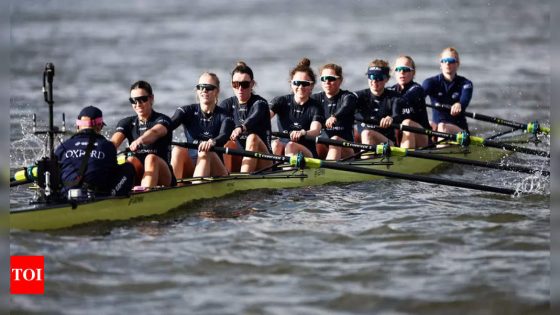NEW DELHI: The coach of Oxford‘s crew participating in the Boat Race has condemned the pollution in London’s River Thames, labeling it a “national disgrace.” Concerns arose after testing conducted by a campaign group revealed elevated levels of E.coli along a segment of the Thames in southwest London, where the historic race is scheduled to take place on Saturday.
In response to the pollution, crew members have been cautioned about the hazards of entering the water and advised to utilize a “cleansing station” located at the race’s finish area. Furthermore, the contamination has raised doubts about the tradition of tossing the winning coxswain into the water after the race.
The company accountable for Thames’ maintenance is facing significant financial challenges, prompting critics to call for its return to state management.
According to figures released by the Environment Agency, sewage spills into England’s rivers and seas by water companies more than doubled in 2023 compared to the previous year, totaling 3.6 million hours of spills in 2023 as opposed to 1.75 million hours in 2022.
Despite the pollution concerns, there has been no indication that the annual Boat Race, a revered tradition between Oxford and Cambridge universities dating back to 1829, will be cancelled. Both the women’s and men’s races are set to proceed along the same 4.2-mile (6.8-kilometer) stretch of the Thames.
Expressing dismay over the condition of the water, Oxford coach Sean Bowden highlighted the urgent need for action.
“It’s a national disgrace, isn’t it?” Bowden posed. “It would be terrific if the Boat Race drew attention to it. We are very keen to play a part and we recognize we have a role and a responsibility to it.
“Why,” he added in British newspaper The Daily Telegraph, “would you want to put your kids out in that?”
Invariably, the focus has turned to whether the winning crew will dunk its cox into the Thames at the end of the race.
“If there’s a health and safety problem, I don’t think we’ll be throwing him in because we don’t want to risk that,” said Harry Glenister, who has rowed for Britain and will compete for Oxford.
“It’s just too much of a risk. We support whatever the Boat Race is saying about the conditions in the water. We just hope we’ll win and then we’ll decide.”
Cambridge has been dominant in recent years, winning four out of the last five men’s races, giving them a lead of 86 victories to Oxford’s 81 in the historic rivalry.
Similarly, Cambridge has enjoyed remarkable success in the women’s race, securing victory in six consecutive editions.
E.coli bacteria are typically found in the intestines of healthy individuals and animals. The majority of strains are harmless and may only cause brief episodes of diarrhea, from which most people recover without significant complications, as stated by the Mayo Clinic.
However, even small amounts of certain strains, such as those found in contaminated water, can lead to various conditions, including urinary tract infections, cystitis, intestinal infections, and vomiting. In severe cases, exposure to these strains can result in life-threatening blood poisoning.
According to River Action, a campaign group, testing conducted in specific locations indicates that the pollution source likely stems from Thames Water, the utility company, discharging sewage directly into the river and its tributaries.
Thames Water, Britain’s largest water company, is under considerable pressure to address the pollution issues in the river. However, the company maintains that the elevated levels of E.coli may not be entirely attributable to its actions.
“I would point out that E.coli has many different sources,” the company’s recently appointed chief executive Chris Weston told the BBC.
“It is not just from sewage, it is also from land run-off, it is from highway run-off, it is from animal feces. All of those things contribute to the problem and I am absolutely determined that, at Thames, we will play our part in cleaning up the problem and so the Thames is a river that people can use as they would like to everyday.”
Last summer, Thames Water formulated a plan requesting investors to infuse approximately £4 billion ($5.05 billion) into the company over the next five years. However, on Thursday, shareholders declined to provide the initial payment of £500 million ($630 million) without a substantial rise in consumers’ water bills, a demand rejected by the industry regulator.
Despite this setback, CEO Weston asserted that Thames Water continues to operate normally despite its significant debt, as the company possesses adequate financial resources to sustain itself until next year. Weston expressed hope that a new funding arrangement would be reached by then. Nevertheless, there is speculation that the company may face nationalization due to its financial challenges.
The deteriorating condition of many of Britain’s rivers, canals, and coastlines is poised to be a prominent issue in the upcoming general election, anticipated in the next few months. The Labour Party, leading significantly in opinion polls over the governing Conservatives, has vowed to ensure that “new investment is directed toward repairing the broken sewage system without burdening taxpayers.”
(With AP inputs)
In response to the pollution, crew members have been cautioned about the hazards of entering the water and advised to utilize a “cleansing station” located at the race’s finish area. Furthermore, the contamination has raised doubts about the tradition of tossing the winning coxswain into the water after the race.
The company accountable for Thames’ maintenance is facing significant financial challenges, prompting critics to call for its return to state management.
According to figures released by the Environment Agency, sewage spills into England’s rivers and seas by water companies more than doubled in 2023 compared to the previous year, totaling 3.6 million hours of spills in 2023 as opposed to 1.75 million hours in 2022.
Despite the pollution concerns, there has been no indication that the annual Boat Race, a revered tradition between Oxford and Cambridge universities dating back to 1829, will be cancelled. Both the women’s and men’s races are set to proceed along the same 4.2-mile (6.8-kilometer) stretch of the Thames.
Expressing dismay over the condition of the water, Oxford coach Sean Bowden highlighted the urgent need for action.
“It’s a national disgrace, isn’t it?” Bowden posed. “It would be terrific if the Boat Race drew attention to it. We are very keen to play a part and we recognize we have a role and a responsibility to it.
“Why,” he added in British newspaper The Daily Telegraph, “would you want to put your kids out in that?”
Invariably, the focus has turned to whether the winning crew will dunk its cox into the Thames at the end of the race.
“If there’s a health and safety problem, I don’t think we’ll be throwing him in because we don’t want to risk that,” said Harry Glenister, who has rowed for Britain and will compete for Oxford.
“It’s just too much of a risk. We support whatever the Boat Race is saying about the conditions in the water. We just hope we’ll win and then we’ll decide.”
Cambridge has been dominant in recent years, winning four out of the last five men’s races, giving them a lead of 86 victories to Oxford’s 81 in the historic rivalry.
Similarly, Cambridge has enjoyed remarkable success in the women’s race, securing victory in six consecutive editions.
E.coli bacteria are typically found in the intestines of healthy individuals and animals. The majority of strains are harmless and may only cause brief episodes of diarrhea, from which most people recover without significant complications, as stated by the Mayo Clinic.
However, even small amounts of certain strains, such as those found in contaminated water, can lead to various conditions, including urinary tract infections, cystitis, intestinal infections, and vomiting. In severe cases, exposure to these strains can result in life-threatening blood poisoning.
According to River Action, a campaign group, testing conducted in specific locations indicates that the pollution source likely stems from Thames Water, the utility company, discharging sewage directly into the river and its tributaries.
Thames Water, Britain’s largest water company, is under considerable pressure to address the pollution issues in the river. However, the company maintains that the elevated levels of E.coli may not be entirely attributable to its actions.
“I would point out that E.coli has many different sources,” the company’s recently appointed chief executive Chris Weston told the BBC.
“It is not just from sewage, it is also from land run-off, it is from highway run-off, it is from animal feces. All of those things contribute to the problem and I am absolutely determined that, at Thames, we will play our part in cleaning up the problem and so the Thames is a river that people can use as they would like to everyday.”
Last summer, Thames Water formulated a plan requesting investors to infuse approximately £4 billion ($5.05 billion) into the company over the next five years. However, on Thursday, shareholders declined to provide the initial payment of £500 million ($630 million) without a substantial rise in consumers’ water bills, a demand rejected by the industry regulator.
Despite this setback, CEO Weston asserted that Thames Water continues to operate normally despite its significant debt, as the company possesses adequate financial resources to sustain itself until next year. Weston expressed hope that a new funding arrangement would be reached by then. Nevertheless, there is speculation that the company may face nationalization due to its financial challenges.
The deteriorating condition of many of Britain’s rivers, canals, and coastlines is poised to be a prominent issue in the upcoming general election, anticipated in the next few months. The Labour Party, leading significantly in opinion polls over the governing Conservatives, has vowed to ensure that “new investment is directed toward repairing the broken sewage system without burdening taxpayers.”
(With AP inputs)
Source Agencies




